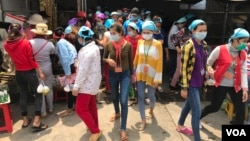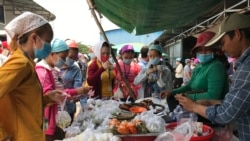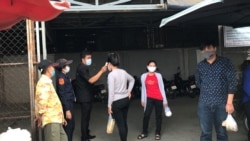At 11:30 a.m. in Kandal’s Takmao district, garment workers, many with surgical masks covering their faces, are streaming out of a factory during their lunch break. As they pass the factory gate, they wash their hands with alcohol, repeating the safety measure when they return.
Buying rice outside the factory, Sae Vuthy, who sews garments, said the factory was providing alcohol to sanitize their hands, checking their temperatures and has even given them masks to wear on the factory floor. Factory managers had instructed them to maintain hygiene standards, she added.
“We were told to wear a mask often and to not go anywhere there was no sanitation,” she said.
She has been washing her hands frequently and using an alcohol-based gel to wash her hands.
The measures have been necessitated by the spike in coronavirus cases reported in Cambodia in the last three weeks. As of Monday morning, there were 86 confirmed cases, with the last 10 days registering at least 80 of those cases.
The government has ordered the closure of private and public schools, cinemas, and public gatherings. In the last week, Vietnam and Thailand have also closed their land borders with Cambodia, though the transfer of goods is expected to continue.
But, the government has not ordered businesses to enforce work-from-home policies nor called for the closure of private enterprises. This has created concern among garment workers, who often work in cramped spaces and unsanitary conditions.
The Better Factories Cambodia compliance report for exporting garment factories showed that 30 percent of factories did not have adequate hand washing facilities and adequate soap. Additionally, Sixty-one percent did not have adequate accessible toilets.
Sae Vuthy was concerned she was seated very close to her colleagues, which put her at risk of potentially contracting the respiratory disease.
“I'm really afraid of that. But we have to work because if we don’t work we don’t have money,” she said.
Ath Thorn, president of the Cambodian Labor Confederation, said overcrowding in factories had the potential to exasperate the viral crisis, but that factory closures would result in heavy economic losses.
He added that unions had been asked factory owners to ensure better sanitary and screening measures on the factory floor, and some were responding.
“The companies are also taking measures because they are worried that if there are one or two infected people at their factory, their company might have a problem,” he said.
VOA Khmer could not be reached for comment by Ken Loo, secretary-general of the Garment Manufacturers Association of Cambodia (GMAC) and Kaing Monika, deputy secretary-general.
However, when the Cambodian Confederation of Unions released a statement last week raising concerns over worker safety during the pandemic, GMAC dismissed those concerns in their statement by saying factories had made worker safety a top priority.
Heng Sour, a spokesperson for the Ministry of Labor, said no factories had stopped operations on account of the viral disease, but that the key was to keep workers safe during their transit to and from work.
“When they come to work, they have to meet no new customers, like in restaurants or elsewhere, so they work with their colleagues who are already safe,” Heng Sour said.






